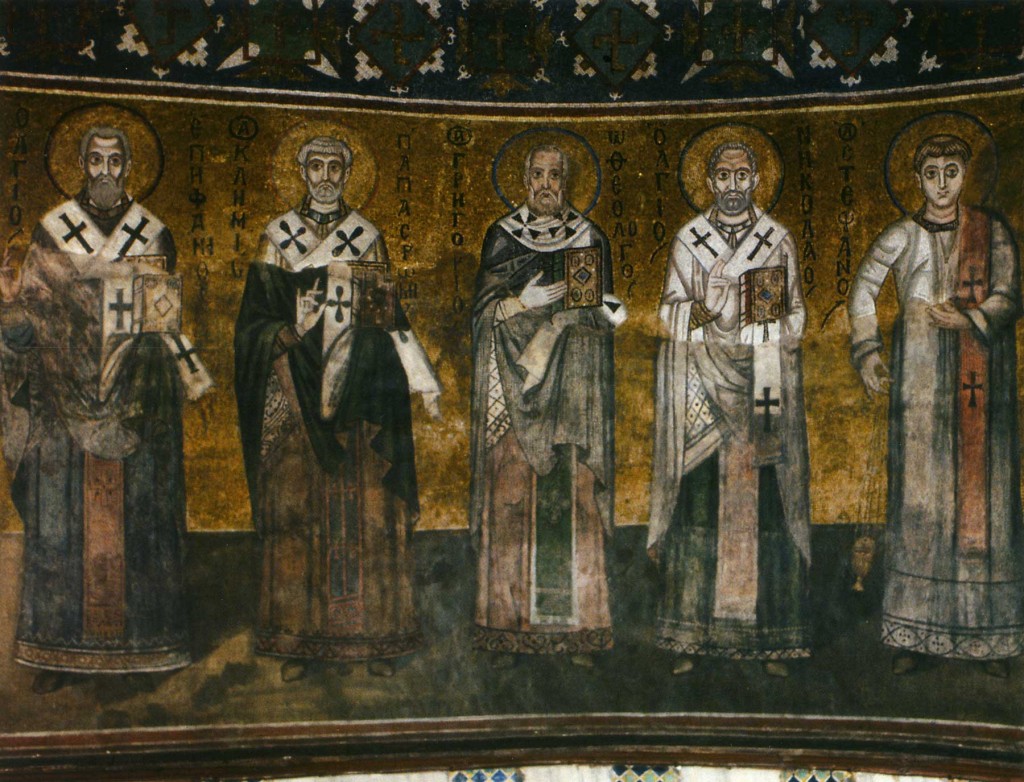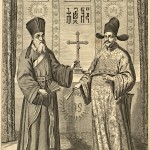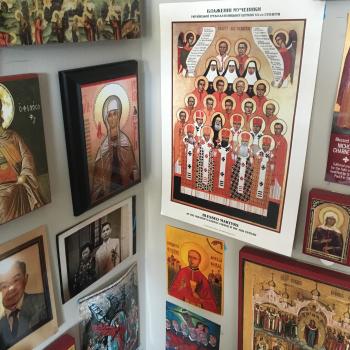
Second, we learn from Archbishop Job that how exactly autocephaly gets granted has really been a matter of oikonomia in the practice of the Ecumenical Patriarchate, even though the word ‘oikonomia’ comes from the mouth of the interviewer interpreting Archbishop Job’s words. As many scholars of the Orthodox canons have noted (including and especially Sister Vassa), oikonomia is a key principle in interpreting and implementing canons.
The use of this word comes from St Basil the Great’s first canon, where he talks about how to receive former heretics back into communion with the Orthodox Church. In a classic line, Basil says: ‘Inasmuch, however, as it has seemed best to some of those in the regions of Asia, for the sake of extraordinary concession (or “economy” [oikonomia]) to the many, to accept their baptism, let it be accepted’ (emphasis mine). Later on in the canon, he says that he actually disagreed with this practice, preferring to rebaptize these heretics but only refraining from doing so because his brother bishops were simply receiving them back into communion by chrismation:
I deem, therefore, that since there is nothing definitely prescribed as regards them, it was fitting that we should set their baptism aside, and if any of them appears to have left them, he shall be baptized upon joining the Church. If, however, this is to become an obstacle in the general economy (of the Church), we must again adopt the custom and follow the Fathers who economically regulated the affairs of our Church. For I am inclined to suspect that we may by the severity of the proposition actually prevent men from being saved because of their being too indolent in regard to baptism. But if they keep our baptism, let this not deter us. For we are not obliged to return thanks to them, but to serve the Canons with exactitude. (Emphasis mine.)
What is oikonomia, then? Here in Basil, it’s a mixture of ‘extraordinary concession‘ and the way things work in the Church; as Sister Vassa points out, oikonomia is simply a combination of the words oikos (house) and nomos (law), which means that it’s for ‘house-building’ – the ‘building up of God’s house,’ as she puts it in my favourite video of hers. Put another way, a canon – which is just Greek for a ‘measure’ – is a tool for building up the house of God. What that means, as Sister Vassa further pointed out in an article in Logos and at a conference on canons, is that there are a number of canons that the Orthodox Church doesn’t even use anymore because they don’t build up God’s house (such as the injunctions against letting women into church or being able to dine with Jews). When Basil says that he is is ‘obliged…to serve the Canons with exactitude,’ it’s literally oikonomia that he has in mind, then. It’s not rigorous legalism because what he is saying is that whether you rebaptize heretics or not, the bottom line is that – strictly canonically speaking – they’re still going to be walking in the correct baptism anyway by holding to the Orthodox faith. It’s also not to thank heretics for joining the Orthodox Church again; oikonomia is not about laxness either because they still have to keep the Orthodox faith. Instead, serving the canons ‘with exactitude’ means that you use canons only in the way that they’re supposed to be used – not to thank heretics for joining the Church again, not to be a rigorous legalist, but only for the building up of God’s house. As Sister Vassa puts it eloquently in that favourite video of mine, ‘Oikonomia is not just a method of interpreting canons; it is the purpose of all the canons, as St Basil shows us.’
In the same way, the spat between Archbishop Job and the Moscow Patriarchate is not really over whose interpretation of the canons about primacy and the granting of autocephaly is more correct and rigorous, it’s instead over the question of who is really practicing oikonomia. Moscow wants everybody to think that it’s they who are really practicing oikonomia, framing the Ecumenical Patriarchate as the legalistic bad guy. A recent example of this is that when Antioch, Bulgaria, and Georgia pulled out of the Holy and Great Council, Moscow protested the intransigence of the Ecumenical Patriarchate in stubbornly going forward with the Holy and Great Council as planned in documents. As Moscow was putting it, sticking with the letter of what had been agreed upon was not an act of building up God’s house. The Moscow Patriarchate was therefore accusing the Ecumenical Patriarchate of not practicing oikonomia because it failed to be flexible in postponing the council so that everyone in God’s house could participate.
Job of Telmessos tells us the complete opposite story. Instead of the Ecumenical Patriarchate as a ruthless set of legalists operating without canonical flexibility, Archbishop Job says that, in the planning stages, Constantinople bent over backward to compromise on the question of who really grants autocephaly. If you want to talk canonical rigor, technically it’s only Constantinople that can grant a church autocephaly; after all, as we previously noted, Constantinople is New Rome, and there is no such canonical thing as a Third Rome. Because this is what the canons say, this is how the conversations about autocephaly started:
In the course of preparation of the Pan-Orthodox Council, the issue of autocephaly and its proclamation was raised and discussed. There are texts of the documents that were drawn up. I will tell about the whole process to understand at what point everything stopped. The study began with the allegation that the Ecumenical Patriarchate was considered the only Patriarchate in the Orthodox world, which had the right to grant autocephaly both for historical and canonical reasons. In the history all new autocephalous churches which appeared starting from the XVI century, beginning with the rise of the Russian Orthodox Church until now – are the former territories of the Ecumenical Patriarchate, to which it granted autocephaly. And for canonical reasons the Ecumenical Patriarchate holds the first place in the Orthodox world. (Emphasis mine.)
However, Archbishop Job claims that, in the interest of building up God’s house, everybody who was at this discussion thought that it wasn’t such a good idea for the Ecumenical Patriarch to be the only church that could grant autocephaly: ‘No! Constantinople alone cannot grant the autocephalous status. It should be added that for granting autocephaly there should be consent and request of that Church, a part of which wants to become autocephalous.’ Here, we have Archbishop Job’s first mention of Ukraine: ‘Here an actual example shall be provided, if Ukraine wants to obtain autocephaly, then Constantinople alone cannot establish it, a request of the Russian Orthodox Church is required, as Ukraine is currently in the bosom of this Church.’ In other words, just because the Ecumenical Patriarchate is the only church that can grant autocephaly in a rigorous way doesn’t mean that it’s a good idea. For the sake of oikonomia, other churches should also be required to be part of the granting, to the point that it should even be acknowledged – even if it means risking an extraordinary concession to Russian World ideology – that Ukrainian autocephaly requires Russian assent, especially because there is very much a Ukrainian Orthodox Church-Moscow Patriarchate (UOP-MP) in Ukraine. Giving canonical autocephaly to the Ukrainian Orthodox Church-Kyivan Patriarchate (UOP-KP) – which also very much exists (as well as the UAOC) and would probably take in a good deal of UOP-MP temples – is not a matter of ideology or politics or even a legalistic reading of the canons – it’s a matter of oikonomia. ‘Then, in the framework of preparation for the Pan-Orthodox Council,’ Archbishop Job says, ‘the Patriarchate of Constantinople displayed willingness to compromise, and agreed that autocephaly can be granted by Constantinople only with the consent and upon request of the Church, to which this part belongs.’
How would this kind of autocephaly be granted? Here, Archbishop Job lets us in on the details of the autocephaly discussions. What technically happens when a church is granted autocephaly, Archbishop Job says, is that a ‘document that proclaims the church autocephaly’ called a Tomos is signed. Canonically, only Constantinople gets to sign this document under the word ‘proclaim.’ In the discussions, the churches agreed, ‘No! It should be signed by all heads, all heads of the local churches. They have to be in agreement, they should mutually recognize this new church,’ and as Archbishop Job tells the story, ‘Again, the Constantinople Patriarchate made a compromise and said, “OK. The Tomos will be signed by all heads of the local Churches.”’
The problem arose as to how the various churches would sign the Tomos. At first, they talked about signing it just like the ‘Orthodox diptychs,’ which would have been simply to make a list of patriarchs after the word ‘proclaim’ signed by Constantinople. But as the discussions developed, the term ‘collegially proclaim’ arose:
Again, there was discussion, and again a new requirement was made: “No! Other patriarchs also should add the word after his signature.” And Constantinople again agreed to a compromise. It said, “Well, then let us do it like this: the Ecumenical Patriarch signs and puts the word “proclaim” and the other patriarchs sign it and put the wording “collegially proclaim” according to the principle of liturgical worship.” After all, when the Divine Liturgy is performed, it is always the first hierarch who celebrates, whom we deem to be presiding over the service, while others co-celebrate.
Here, Archbishop Job pivots from canons to liturgy, which, as Sister Vassa reminds us on how she went from being interested in canons to liturgy in her doctoral studies, are two sides of the same coin:
At the symposium Fr. Taft [the Pontifical Oriental Institute’s Robert Taft SJ] offered to finance and direct my work if I wrote my dissertation on Byzantine Liturgy (and not Canon Law, which he called “the bad side of the good news”), because, as he then put it, “The ROCOR has always been good at celebrating liturgy. Wouldn’t it be nice if it also had someone who knew something about it? Go tell your bishop that and let me know what he says.”
Archbishop Job again does something similar to Sister Vassa here; although he’s still talking about canons, he says that the ordering of the patriarchs of the various autocephalous churches is really about how they would order themselves in a Divine Liturgy, especially around the main presider. Of course, this liturgical situation allows only for one primate – a ‘first without equals,’ as Elpidophoros Lambriniadis unfortunately puts it (making it sound like a terrible power trip when it isn’t) – but it’s a primacy that’s collegial, which is why you can collegially proclaim something alongside a primate who writes proclaim – in the same way that they would collegially preside over a Divine Liturgy alongside a primate who is doing the presiding. Of course, Moscow also saw what this meant – that it will never be that presiding primate – and objected: ‘And again the representatives of the Moscow Patriarchate disagreed — with the word “collegially proclaim.” They wanted every patriarch to put his signature with the word “proclaim”.’
But note the response of the Ecumenical Patriarchate: ‘And here the Ecumenical Patriarchate disagreed. Not because of its dignity or for some political reason. Just because it is illogical and wrong. Only one person can proclaim and others, who are with him, can only collegially proclaim. Everyone cannot proclaim separately.’ Archbishop Job does not call Moscow out for its pretensions to power here. Instead, he calls Moscow out for its failure of oikonomia – after all, if every church writes ‘proclaim’ separately, it follows that they are all celebrating different Divine Liturgies, which would mean that this house is divided. As St Ignatius of Antioch teaches, ‘Be careful, then, to observe a single Eucharist. For there is one flesh of our Lord, Jesus Christ, and one cup of his blood that makes us one, and one altar, just as there is one bishop along with the presbytery and the deacons, my fellow slaves’ (Ign. Phil. 4); because of this, Canon 31 of the Holy Apostles and Canons 5 and 6 of the regional synod at Antioch in 341 (as two canonical examples) condemn the setting up of another altar beside that of the bishop’s as the prime example of what schism looks like.
The result of this disagreement over ‘proclaim’ and ‘collegially proclaim’ in the Tomos is that the Orthodox Church has remained divided over autocephaly: ‘And since that time this issue has been blocked. And since the time when these meetings were held in 2009, if I am not mistaken, it has remained blocked.’ What that also means is that ‘the issue of autocephaly now regains the status quo it had at the beginning of its consideration…as no conclusion was made for all the ratified compromise versions.’ Constantinople wanted to practice oikonomia on the question of autocephaly, Archbishop Job says, and because Moscow blocked it, it’s not Constantinople’s fault that the canons saying that only Constantinople can grant autocephaly are still in full force.
This canonical situation, in turn – as the interview then turns – has tremendous implications for Ukraine.












